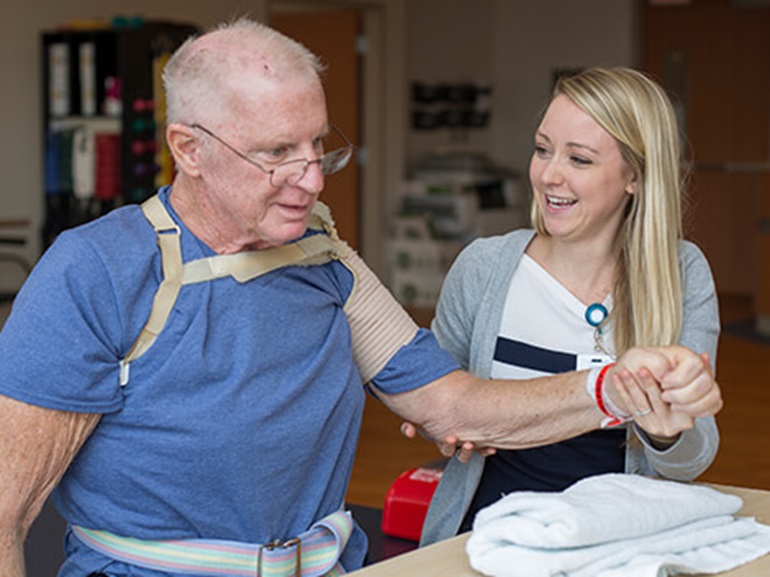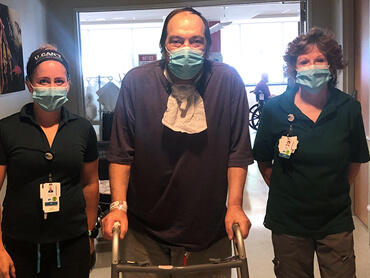Medically Complex Rehabilitation

We’re here to help
An illness or chronic condition may leave you weak and lacking the strength, skills and energy to perform everyday tasks. You may have balance, walking or speaking challenges, as well as cognition and memory issues.
Our medical rehabilitation specialists understand these difficult and frustrating situations. We offer advanced treatment, strategies and support to restore strength, endurance and abilities.
-
Our experienced rehabilitation teams treat patients recovering from a wide range of medically complex conditions, such as:
- COVID-19
- Cancer
- Post-surgical care for coronary artery bypass grafting (CABG), abdominal aortic aneurysm (AAA) repair, left ventricular assistive device (LVAD) implantation and other cardiovascular procedures
- Fatigue from cardiac conditions such as congestive heart failure (CHF) and myocardial infarction (MI)
- Frailty from chronic obstructive pulmonary disease (COPD), emphysema and asthma
-
Helen M. Simpson Rehabilitation Hospital draws on the expertise of medical rehabilitation specialists to address the range of physical and functional issues that occur from medically complex conditions.
This interdisciplinary team is led by a physiatrist, a physician board-certified in physical medicine and rehabilitation and includes rehabilitation nurses; physical, occupational and speech therapists; dietitians; pharmacists; case managers and other clinical and support staff, as needed.
In addition, family members are an important part of the care team. They may be asked to participate in therapy sessions to understand and support your needs.
-
Every patient is different with varied challenges, goals and expectations. Treatment will be tailored to your individual needs to help:
- Restore physical abilities
- Build strength and endurance
- Improve balance, coordination and mobility
- Enhance skills to perform daily activities
- Optimize independence
-
Your therapy sessions will include hands-on activities with some aided by high-tech therapy equipment. Sessions will be provided three hours per day, five days a week or 15 hours over a seven-day period, depending on your tolerance and ability to actively participate.
Your care plan may focus on:
- Mobility skills training such as transfers, standing and/or walking
- Strengthening, coordination and endurance exercises
- Tactics to improve communication, swallowing and/or vision
- Daily living activities such as dressing, eating and bathing
- Strategies to improve memory, concentration, judgment and problem solving
- Medication management
- Strategies for returning home and to community life
- Caregiver education and training
It's important to remember that recovery takes time. Each patient is different and your stay with us will depend on your diagnosis, rehabilitation needs and goals and daily progress.
-
Helen M. Simpson Rehabilitation Hospital’s cardiac recovery program focuses on the skills, strategies and techniques you need to restore strength, avoid complications and move forward safely and confidently.
Your team will establish specific cardiac parameters and monitor you closely, particularly during exercise, rest periods and post-exercise recovery. We will provide the care and extensive training to help you:
- Protect your incision while dressing, grooming and bathing
- Practice sternal precautions
- Follow guidelines to minimize pain, swelling and the risk of potential complications
- Maintain blood pressure and cholesterol levels
- Adapt new ways of performing daily activities
- Conserve energy
- Prepare you to begin a cardiac rehabilitation program under the direction of your cardiologist or surgeon
Additionally, your treatment team will review medications, including anticoagulant therapy and diabetic protocols, and discuss diet, exercise and pain management. We will provide you with the knowledge and strategies to better:
- Understand your surgery and its effect on the body
- Recognize the signs and symptoms of possible infection
- Manage your medications and be aware of side effects
- Monitor your weight and recognize the importance of weight management
- Monitor your blood pressure and heart rate
- Maintain a healthy lifestyle, including a heart-healthy diet, stopping smoking and stress management
- Utilize the tools and strategies that will aid in the transition home and resumption of daily activities
-
Aquatic therapy is a safe, effective form of rehabilitation for those who may have difficulty exercising on land.
The buoyancy of water supports the body helping ease an individual's fear of falling and promoting mobility, balance, strength and improving gait. Buoyancy, resistance and heat are some of the key elements that make aquatic therapy ideal in addressing balance, upper and lower extremity stretching and walking progression. Our pool is heated, wheelchair-accessible and equipped with gait observation cameras.
Our care team will determine whether you may benefit from aquatic therapy.
*Please note: aquatic therapy is not currently being offered due to COVID-19 restrictions. We hope to offer it again in the near future.
-
To help you return home and resume work, school, community and/or social activities, Helen M. Simpson Rehabilitation Hospital provides unparalleled continuity of care. We are here to help you manage your health from inpatient to outpatient care.

How Can We Help You?
We will work closely with you and your family, physician and/or the referring hospital to ensure a smooth transition to Helen M. Simpson Rehabilitation Hospital for your recovery.